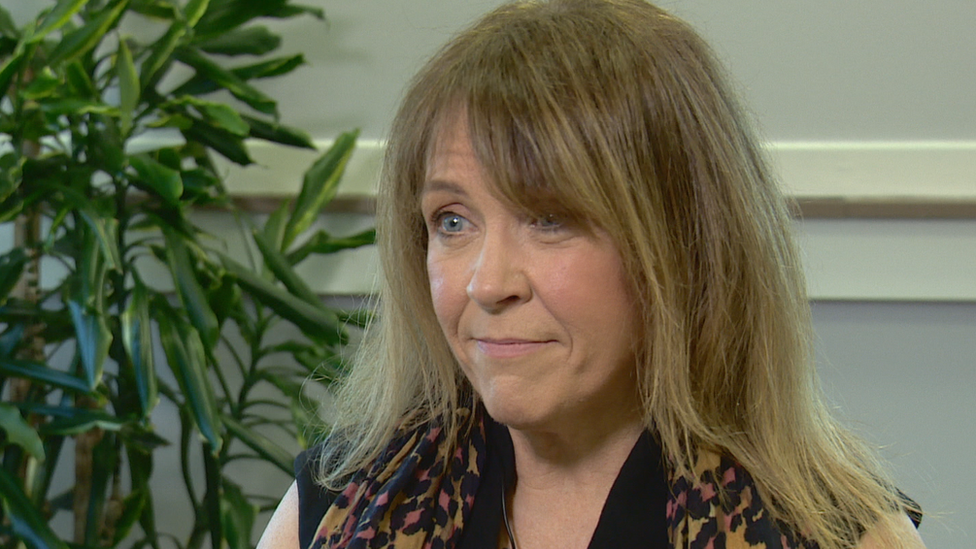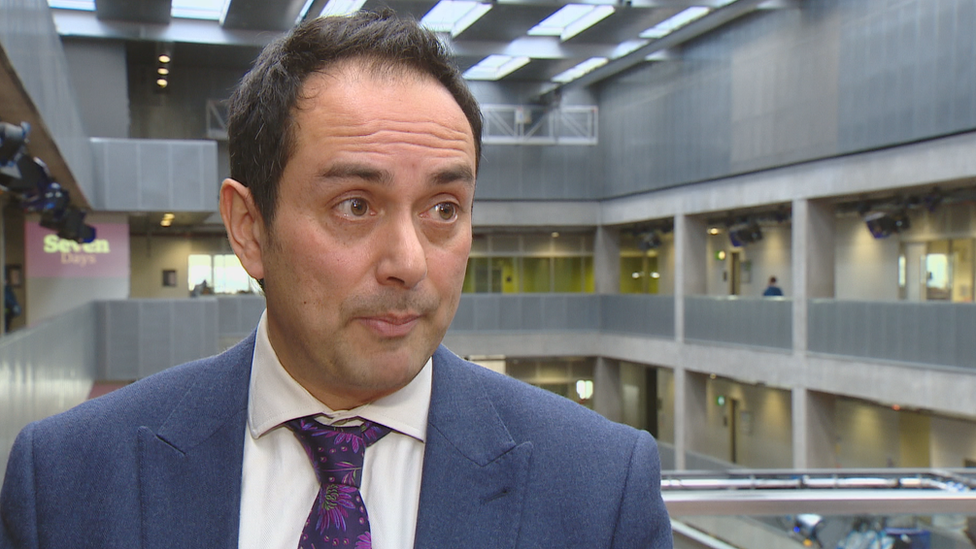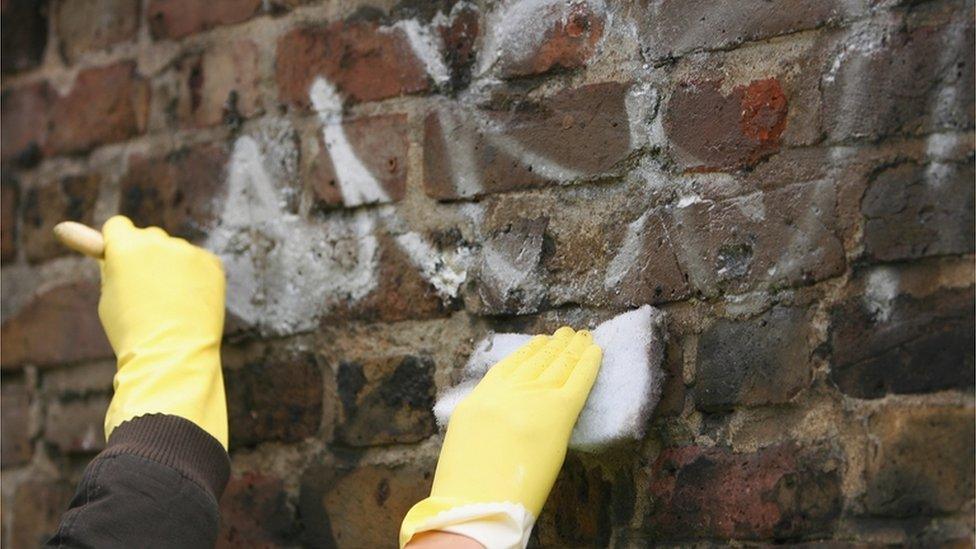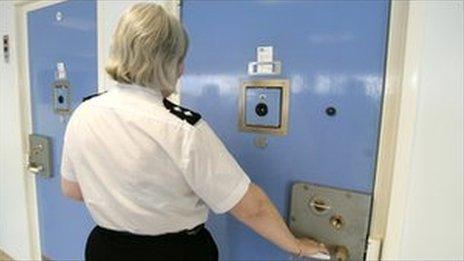Warning over options for keeping Scottish women out of prison
- Published

Karyn McCluskey said too many women were being sent to prison
Most women who end up behind bars would be better off being cared for outside prison, a leading expert has said.
Karyn McCluskey, the head of government agency Community Justice Scotland, said there were not enough options for keeping female offenders out of jail.
She told BBC Scotland there were too many women in custody but the measures for dealing with them outside prison were "patchy".
About 91% of women get a sentence of less than a year.
Later this year the Scottish government will introduce a presumption against prison sentences of 12 months or less.
Ms McCluskey said cutting the number of people sent to prison must mean spending more money in community justice projects such as community payback orders, restriction of liberty orders, drug treatment and testing orders or bail supervision.
A Scottish government spokesman said it had provided extra funding to local Community Justice Partnerships to deliver support for female offenders and was working to transform the prison estate for women in Scotland.

Cornton Vale prison is being demolished as the government tries to reduce the number of women in jail
Research last year found a quarter of Scotland's female prison population was on remand awaiting trial.
Other studies have found that bail supervision as an alternative to sending people to prison on remand was cost effective and popular with some sheriffs.
But its use has fallen by a quarter over the past five years.
Ms McCluskey said many women needed help and support more than prison and that some female-specific bail projects had disappeared.
'Lifetime of trauma'
Before taking up her current post, Ms McCluskey was the director of the police's Violence Reduction Unit (VRU) which has had a dramatic impact on reducing violence in Glasgow.
The VRU concentrates on the prevention rather than solving of crimes, looking at how people end up in a cycle of violence through domestic abuse, addiction and neglect.
Ms McCluskey believes a similar approach should be taken to reducing the number of women in prison.
"For most of the women who end up in custody, and it is almost 1,000 a year, they would be better off with a care package than ending up in the prison system," she said.
"My plea to the public is to understand how complex the women I come across are.
"They are some of the most damaged people. They have had a lifetime of trauma.
"You have to jail those you are afraid of and not those you are mad at."
Ms McCluskey said locking women up for shoplifting and crimes of dishonesty did not work and they needed help to break the cycle of crime.

'I lost the ability to make positive decisions'
The ex-offender who became a dance instructor
Samantha is 22.
She became homeless when she was a teenager and after low-level offending she faced being sent to prison for a longer sentence.
Instead, she got the offer of probation and support through Glasgow charity Achieve More which runs dance and football training.
Samantha says that made all the difference.
"When I was younger I went through a bit of a hard time and I kind of struggled to deal with things," she says.
"A lot of that was drinking and anti-social behaviour, you know, shouting or arguing, just silly little things.
"On a regular basis I found myself being taken into custody and having to be let out the next morning or being taken to court in a couple of weeks or whatever it might have been. It wasn't a great time."

Samantha says that after her conviction she was put on probation and allocated a support worker who she saw every week.
"That gave me a bit of a release, where I could go and speak to someone and know that what I was going to say wasn't going to go beyond those walls," she says.
"It meant I could just get everything off my chest and I never had that before.
"That was really good for me. That was one thing that really helped me."
Samantha says becoming homeless at 16 was traumatising.
She says: "At that point I had lost the ability to make positive decisions for myself and when you're around people who are doing the exact same thing it's so hard to get out of it because you feel that if you leave you're going to be alone.
"Had I been sent to prison I feel like I would have been thrown into that same kind of environment and I don't know if it would have been the best thing for me to be honest."
Research says short-term sentences are not an effective way to curb reoffending but that stability, housing, and employment are.
For Samantha the answer was in not going to prison and getting the opportunity to dance.
She says: "It was definitely an outlet for me. I could forget about all my issues and go on and dance and it was a way for me to express myself as well."

'Radical reworking'
The Scottish government's policy is to reduce the number of women in custody.
But the female prison population has been growing in recent years.
Seven years ago former Lord Advocate Elish Angiolini published a report calling for a "radical reworking" of the system.
It called for the female-only prison at Cornton Vale to be demolished and replaced with smaller community-based units.
Dame Elish said the "significant cost to society" of locking up woman suffering from addiction or mental health problems could no longer be ignored.
She said: "For women who are repeatedly committing lower-level offences, we need to get better at tackling the root cause of their problems in the community, and allowing the community to benefit from the punishments imposed."
However, the prison population has shown little reduction since 2012 and there are now 381 women in Scottish jails.
The aim is to have a total of 250 places for woman prisoners in Scotland - with 20 of these for women sent straight to custody while they await trial.
The Angiolini review followed a number of reports and calls for a reduction in sending women to prison.
In 1999, the then chief inspector of prisons, Clive Fairweather, called for the female prison population - then at about 200 - to be reduced to 100.
What is bail supervision?
In a move to primarily reduce the number of women and young offenders sent to prison on remand, bail supervision pilots were introduced across the country in the 1990s.
Supervised bail is a service for people who would otherwise be put on remand and imprisoned while awaiting trial.
Instead they are released on bail on the condition that they meet a bail supervisor, with the aim of supporting accused people to comply with strict conditions.
A 2012 assessment found the pilots were popular with sheriffs and excellent value for money and recommended that they be continued.
In many areas the pilots were then continued by third sector providers such as Sacro and Turning Point.
However, the BBC has found that most of these original projects have now lost their funding.
'Chronic addiction problems'
In most cases the councils responsible - including Glasgow and Renfrewshire - said they had replaced the projects with their own in-house services.
Ms McCluskey told BBC Scotland there was a "huge amount of evidence" that bail supervision worked.
She said bail supervision often meant people who were housing tenants did not lose their homes like they could when they were on remand.
"We have patchy bail supervision at the moment and that definitely needs to improve," she said.
"Some of them have disappeared, we do know that."

Prof Cyrus Tata said there needed to be a major shift away from prison sentences
Prof Cyrus Tata, of the University of Strathclyde, said: "There has to be a major shift in resources from imprisonment to the community.
"Without that shift happening, who can blame a sheriff who has to ask themselves whether or not passing a non-custodial sentence is going to work, if the services in the community simply aren't there to deal with this person's chronic addiction problems, chronic housing needs, they're homeless or whatever it might be."
'Changing profile'
A Scottish government spokesman said it was working to strengthen the provision of alternatives to custody.
He said the government had "protected and strengthened funding" but decisions about the most appropriate projects and interventions were made locally by statutory agencies in each area.
The spokesman said the Scottish government had been providing additional funds for bail services but had also pledged an extra £1.65m over the next three years to build further capacity to deliver and support bail supervision.
He added that it was up to the courts whether they remanded an accused person in custody ahead of their trial or imposed a prison sentence following a conviction.
But he said the Scottish government was investing in the transformation of the prison estate for Scotland's women.
"This phased, evidence-based approach allows us to respond to the changing profile of the female prison population, maintaining our focus on prevention, rehabilitation and trauma-informed support for women who offend," the spokesman said.
- Published29 January 2019

- Published24 June 2018

- Published17 April 2012
